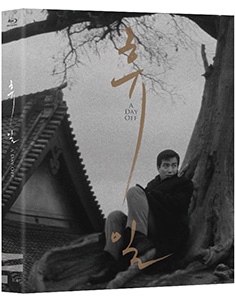
Released on December 4, 2018
|
Blu-ray Collection A Day Off (1968) Director: Lee Man-hee Year : 2018
A Day Off is both one of the masterpieces of 1960s Korean film and its representative modernist film. When it was made, censors forced the producer to abandon the theater release, but the original print was rediscovered during reorganization of the warehouse of the Korean Film Archive in 2005. Famously starring the late Shin Seong-il, who passed away on November 4, 2018, it was selected near the top of the top 100 Korean films list in 2014. Describing with great sophistication the story of an unfortunate couple in the depressing atmosphere of late-1960s Korea, this film allows us once again to see the value and aesthetic excellence of Korean classic film.
Film critic Huh Moon-yung calls this film the “real landscape of modern cinema transcending the ages,” highlighting how highly regarded A Day Off is as a representative piece of Korean modernist film. The film speaks to the audience through the landscape within which the characters are located and its cinematic atmosphere, instead of delivering a story through dialogue. The camera captures the emotions of Huh Wook and Ji-youn in close-up shots, but then throws them into desolate frames via extreme long shots. The poverty-stricken couple walks silently in the windswept Namsan park in early winter, reflecting his inner landscape. The black and white frame with picturesque composition is sad but beautiful. The censorship authorities would not pass this film, as it implies the suicide of the protagonist in a constantly dark atmosphere. In fact, the A Day Off screenplay was turned down three times at the screenplay review stage: the first time because “the film has neither subjectivity nor artistic value”; the second because “it has subjectivity but no artistic value”; finally, the third absurd reason simply read, “It would be better if this kind of film were not made.” It is apparent that Executive Producer Jeon Ok-suk (Yeon Hap Films Co., Ltd) and Director Lee Man-hee continued the production after they had applied for review. They began shooting the film in March 1968 and completed it in a way that reflected the modification instructions issued by the Ministry of Culture and Public Information. But in the end, the film could not be released in theaters, and it was only in 2005 that the film opened to the public, fully 37 years later. Film critics selected the film as one of the top 10 films of that year alongside newer films. The A Day Off screenwriter, Baek Gyeol participated in the commentary, which enhances the value of the film’s historiography as well as the significance of this blu-ray release. Film critic Huh Moon-yung also took part, sharing interesting stories about the production process, filmmaking anecdotes based on the screenplay, and his profound analysis of each scene. Another commentary recorded for the A Day Off DVD by film critic Chung Sung-ill in 2010 also forms part of this blu-ray release, with Korean and English subtitles. There is an additional video, too; a lecture on A Day Off by Huh Moon-yung. In addition, this blu-ray includes video clips showing the film before and after the 4K restoration process. The high-quality booklets that come with all the films in the KOFA DVD Collection are always acclaimed by collectors. This time, HK research professor Oh Young-sook (Institute for East Asian Studies, SungKongHoe University) writes an essay about director Lee Man-hee and his films. |
| Details |
ㅇ Subtitles: Korean, English, Japanese
ㅇ Frame: 1080P HD 2.5:1 ㅇ Audio: Korean LPCM Mono ㅇ Rating: Aged 15 or over ㅇ Running Time: 73 minutes ㅇ Special Features - Commentary 1: Chung Sung-ill (Film Critic & Director) recorded in 2010 - Commentary 2: Baek Gyeol (Screenwriter), Huh Moon-yung (Film Critic) - Lecture by Huh Moon-yung (54 mins) - Video before and after digital restoration - Images ㅇ Booklet - “A Day Off: Authenticity of Shame” Oh Young-sook (HK Research Professor, Institute for East Asian Studies, SungKongHoe University) |
|---|